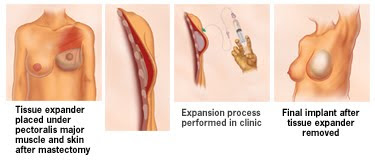From time to time you will get asked by breast cancer patients whether their reconstruction surgery can be done all in one stage at the time of mastectomy. The answer is you can, but there are a number of factors working against you for the best result, such that "baby steps" (planned sequential small procedures)
Typically, most implant reconstruction surgery involves placing a temporary implant called a "tissue expander" at the time of mastectomy that is later replaced by a permanent implant. As compared to a regular implant, a tissue expander is shaped different to maximize shape of the lower breast. It is decidedly more rigid and firm and then permanent devices, particular when silicone implants are later used. The advantage of such specialized devices is that they allow either 1) expansion of the skin by periodically adding fluid to them and 2) better resisting shrinkage of the skin following mastectomy.
Planned 2 stage surgery was popularized by Dr. Pat Maxwell (my mentor) and Dr. Scott Spears, and is well established as the most popular way to do breast reconstruction world wide. There has always been some interest in trying to skip the intermediate step, but doing it predictably is elusive. The big problem is tissue shrinkage of the skin, which as I mentioned is better resisted by the more rigid expander implant versus the softer permanent ones. The best candidates are those with smaller breasts who are having nipple-sparing procedures so that the native skin is 100% conserved. Even in that group, I find I'd be increasingly likely to go back and fat graft to camouflage the implant in a 2nd stage surgery. To my way of thinking, the benefit of single stage surgery just work enough to give up the benefit of the expander structural advantages.
Rob
Tuesday, July 27, 2010
Why is breast cancer reconstruction surgery with implants done in multiple stages? "Baby Steps"
Labels:
breast reconstruction
Subscribe to:
Post Comments (Atom)






No comments:
Post a Comment